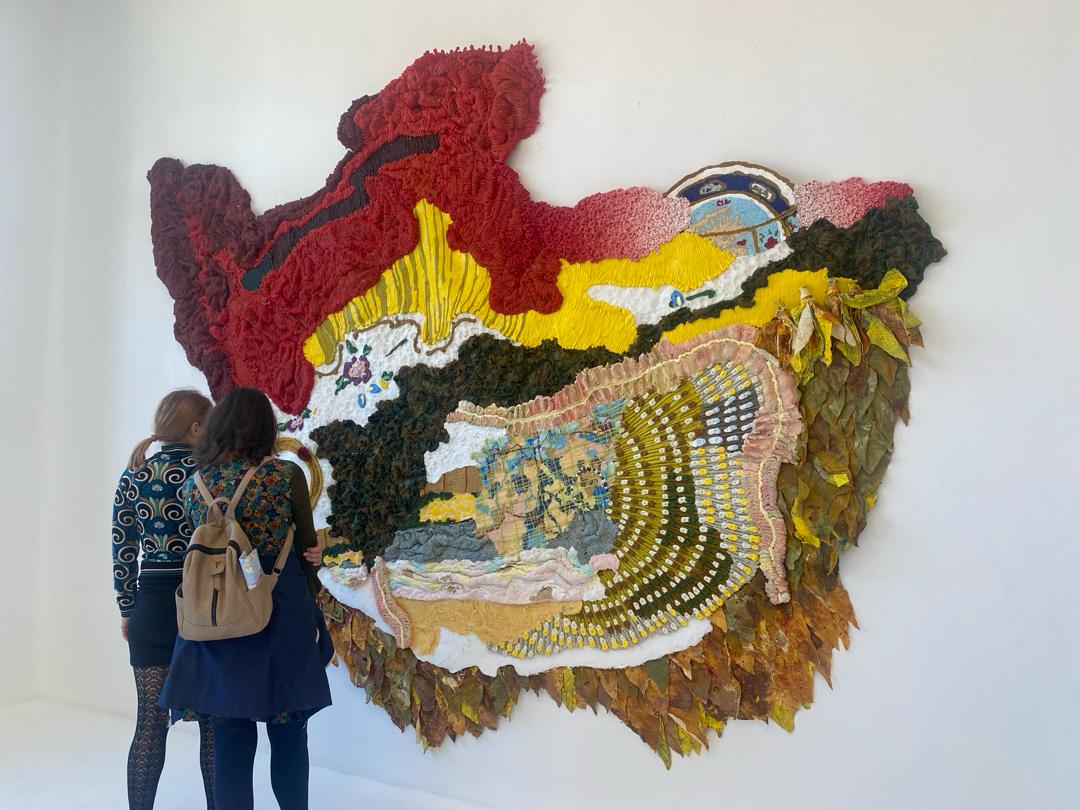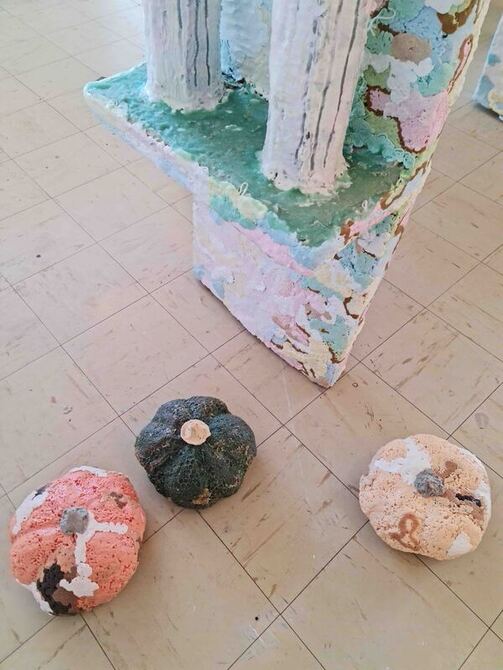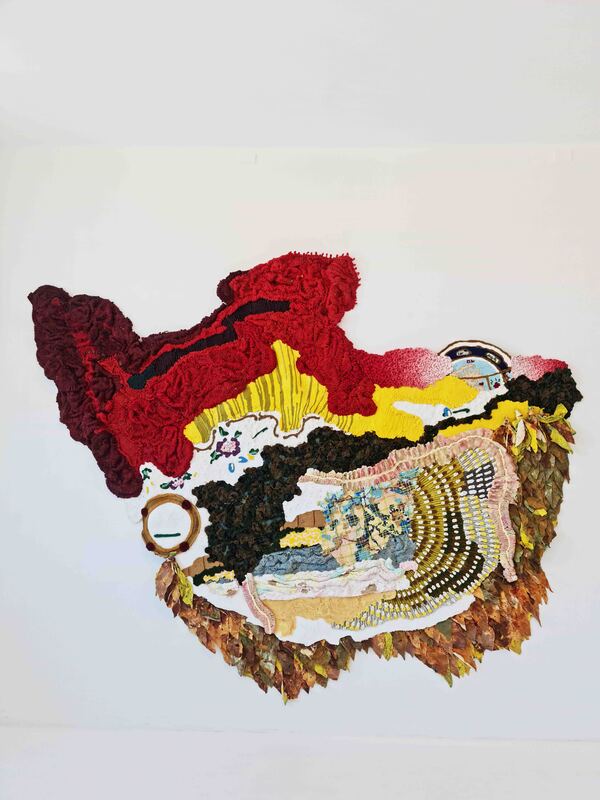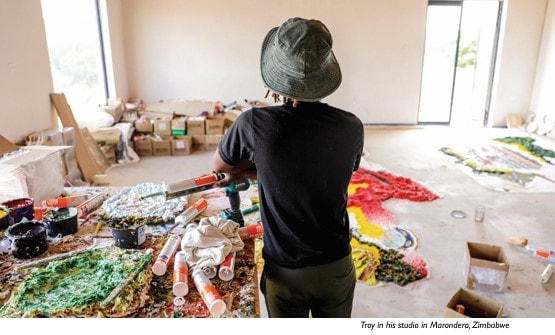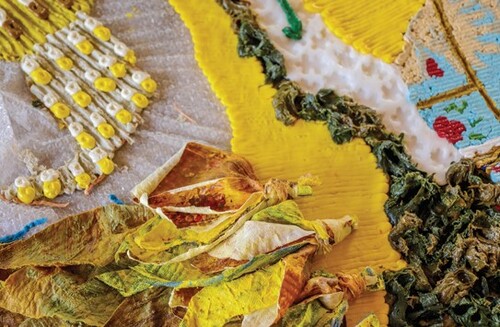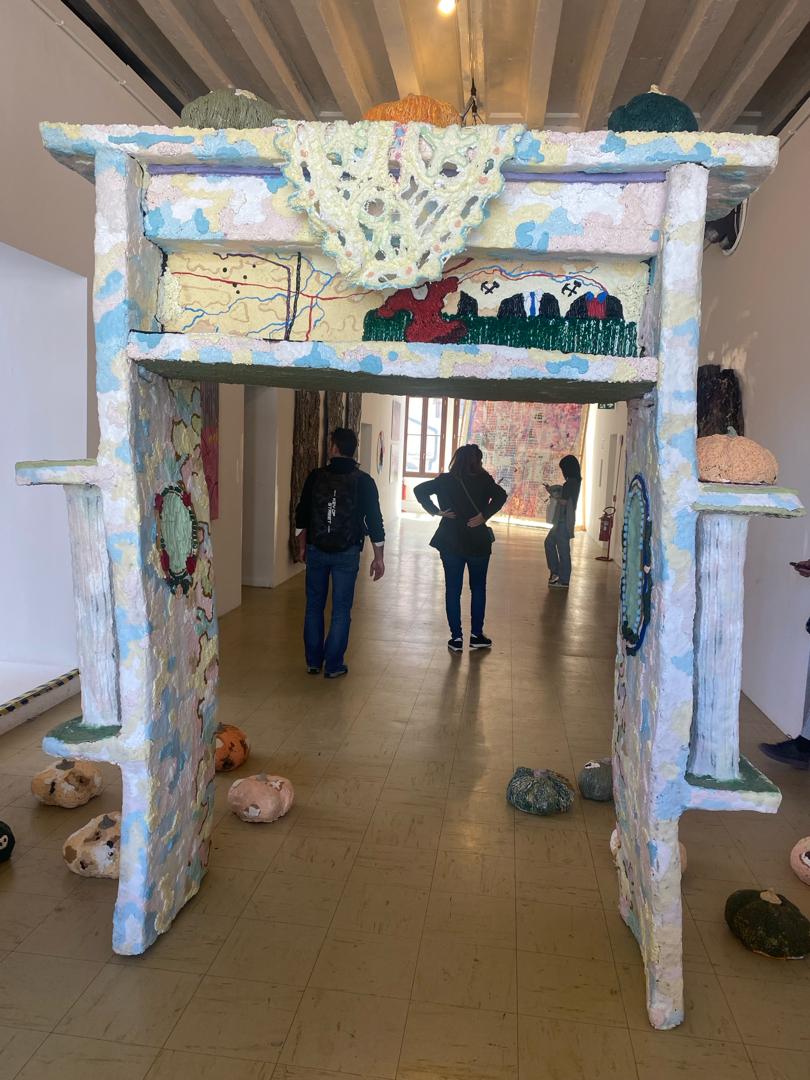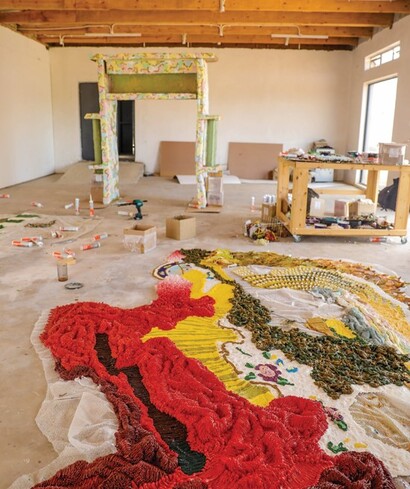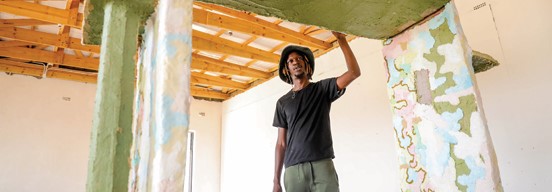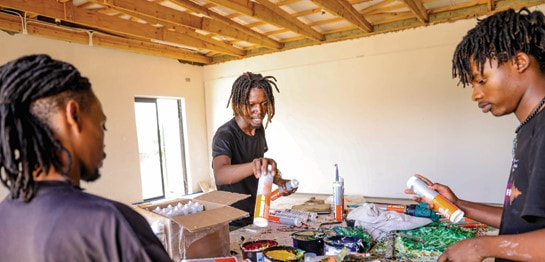Zimbabwean National Pavilion at the 60th Venice Biennale 2024
"Mwana wamambo muranda kumwe"
As an urban Zimbabwean born in 1995, Makaza did not have the ‘luxury’ of encountering Zimbabwe before independence or a world which was not globalised and interconnected. Straddling a world in transition, the key to his evolution as an artist was and continues to be the quest to centre himself and his culture in the way he develops his practice and the way he engages with the world, authentically and uncompromisingly. and painting together, using silicone infused with pigment, a medium which also enabled him to connect with his childhood of doing renovation work with his father and the stories and wisdoms that are passed on traditionally in time and work shared. For Makaza, like urban most Zimbabweans, the connection with land and traditions of rural life are not something distant, the past and the present are something that require constant negotiation and appraisal. In many ways this positions young Zimbabweans, very well when addressing challenges of a Venice and Venice Biennale as a place and context form a critical juncture for Makaza’s practice. alta in November. The experience proved seminal, triggering for Troy an internal conversation about how history and global cultures acknowledge accomplishment, wisdom and beauty. This process led him to develop Byzantium Revisited and St Tura, juxtaposing elements of byzantine design and Christian symbolism with Zimbabwean vernacular and agrarian symbols to push back on cultural domination and privileged conceptions of cultural capital, which how we see ourselves and other cultures. exhibition, presented as unique opportunity to assert the ideas that have been evolving in Makaza’s practice since 2019. The overarching theme of the biennale proposed by Adriano Pedrosa, presented an interesting challenge for an artist, used to asserting his vision unapologetically. world that is overwhelmingly globalised, movement, migration, trade in commodities and to suggest extrospection. Troy Makaza’s Mwana wamambo muranda kumbwe takes an approach that is almost diametrically opposite, using Zimbabwean history and culture as a point of departure and proposing values to globalisation and cultural exchange that are ancient and instrospective. The project then builds on that foundation a work that speak to the present day and the artist’s own realities and growth as a person in complex and interconnected world
As an urban Zimbabwean born in 1995, Makaza did not have the ‘luxury’ of encountering Zimbabwe before independence or a world which was not globalised and interconnected. Straddling a world in transition, the key to his evolution as an artist was and continues to be the quest to centre himself and his culture in the way he develops his practice and the way he engages with the world, authentically and uncompromisingly. and painting together, using silicone infused with pigment, a medium which also enabled him to connect with his childhood of doing renovation work with his father and the stories and wisdoms that are passed on traditionally in time and work shared. For Makaza, like urban most Zimbabweans, the connection with land and traditions of rural life are not something distant, the past and the present are something that require constant negotiation and appraisal. In many ways this positions young Zimbabweans, very well when addressing challenges of a Venice and Venice Biennale as a place and context form a critical juncture for Makaza’s practice. alta in November. The experience proved seminal, triggering for Troy an internal conversation about how history and global cultures acknowledge accomplishment, wisdom and beauty. This process led him to develop Byzantium Revisited and St Tura, juxtaposing elements of byzantine design and Christian symbolism with Zimbabwean vernacular and agrarian symbols to push back on cultural domination and privileged conceptions of cultural capital, which how we see ourselves and other cultures. exhibition, presented as unique opportunity to assert the ideas that have been evolving in Makaza’s practice since 2019. The overarching theme of the biennale proposed by Adriano Pedrosa, presented an interesting challenge for an artist, used to asserting his vision unapologetically. world that is overwhelmingly globalised, movement, migration, trade in commodities and to suggest extrospection. Troy Makaza’s Mwana wamambo muranda kumbwe takes an approach that is almost diametrically opposite, using Zimbabwean history and culture as a point of departure and proposing values to globalisation and cultural exchange that are ancient and instrospective. The project then builds on that foundation a work that speak to the present day and the artist’s own realities and growth as a person in complex and interconnected world
Troy Makaza
Born in 1995, Harare, Zimbabwe
Lives and works in Harare, Zimbabwe
Having specialized in painting in art school but always interested in form and texture, Makaza decided to develop his own hybrid medium which would enable him to unite his artistic goals. After experimenting with various materials, Makaza arrived at silicone a material which can be cast, painted with as well as woven and tied. Over the past eight years Makaza’s works progressively developed as an opportunity to speak both viscerally and philosophically to the issues Makaza finds compelling as a young Zimbabwean concerned with politics, history and power and their impact on daily lives of ordinary people as well as a globally engaged millennial. Resonating with traditional modes like weaving and tapestry but unequivocally contemporary, Makaza’s works articulate the conversation of what African and uniquely Zimbabwean contemporary can be – a paradigm internationally engaging and locally compelling. Makaza’s works has received early critical and collector acclaim, taking part in the 2018 survey of Zimbabwean contemporary art at Zeitz MoCAA, winning the Tomorrows/Today prize at the Investec Cape Town Art Fair in 2019, joining important institutional collections like that of Museum of African Contemporary Art Al Maaden in Marrakech, Rollins College museum collection and noted private collections like Jorge Perez personal collection in Miami.
Selected Exhibitions
2024: Venice Biennale, Zimbabwe National Pavilion, Venice, Italy
2024: MIART, First Floor Gallery Harare, Milan, Italy
2023: Artissima, First Floor Gallery Harare, Turin, Italy
2023: Untwisting the Fantasy, Galerie Poggi, Paris, France
2023: ARCOmadrid, Galerie Poggi, IFEMA Feria de Madrid, Spain
2023: The Armory Show, Javis Center, New York, USA
2023: La Première Pierre, Galerie Poggi, Paris, France
2022: Kufa izuva rimwe, First Floor Gallery Harare, Harare, Zimbabwe
2022: Instinct of great survivors, Primo Marella Gallery, Lugano, Switzerland
2021: Dispatches from Zambesia, Art Basel Miami Beach, Nova, First Floor Gallery Harare, Miami, USA
2019: Tomorrows/Today (art fair prize winner) Cape Town Art Fair, First Floor Gallery Harare, Cape Town, South Africa
|
Harare
2nd Floor Karigamombe Centre 53 Samora Machel Avenue Harare Zimbabwe Email: [email protected] Mobile: +263 77 277 3574 +263 77 570 9031 +263 78 232 6136 Hours: Monday to Friday - 10.00am to 5.00pm, Saturday - 11.00am to 4.00pm Sundays by appointment |
Victoria Falls
Elephants Walk Complex 253 Mosi-Oa-Tunya Victoria Falls Zimbabwe Email: [email protected] Mobile: +263 77 277 3574 +263 77 570 9031 +263 78 232 6136 Hours: Monday to Friday - 10.00am to 5.00pm, Weekends by appointment |
Follow Us
© 2024 First Floor Gallery Harare. ALL RIGHTS RESERVED.

